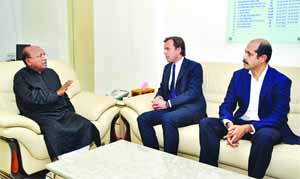Breaking back the reservation caused to the global buyers community after the Rana Plaza collapse in which over 1200 workers perished, Swedish apparel retailer H&M now plans to increase its buying of apparels from Bangladesh as the country has significantly improved its safety and labour rights standards, the company official said.
Report said H&M Chief Executive Officer Karl Johan Persson has made the disclosure at the meeting with Commerce Minister Tofail Ahmed and BGMEA president Atiqul Alam held in the city last week.
Persson said his company hoped to grow its business further in Bangladesh. He is now on a visit to Bangladesh and said he had met with suppliers, trade union leaders and different stakeholders and discussed different issues mainly related to safety and other labour standards.
He also met leaders of BGMEA (Bangladesh Garment Manufacturers and Exporters Association) at the H&M office in Dhaka to discuss relevant issues while visiting here a couple of factories.
He said, Bangladesh has improved a lot in quality and prices, which is great, and we are looking for sustainability after a meeting with Commerce Minister Tofail Ahmed at the secretariat in Dhaka.
He said he was satisfied with the present situation in the RMG sector in Bangladesh. Economic growth in the country is also impressive. A lot of improvements have taken place in the factories, which will greatly benefit the business.
However, Bangladesh needs to do more to deal with three challenges — industrial relations, environmental issues and poor infrastructure — for sustainable business growth, he said.
This was his first visit since the Rana Plaza building collapse. Earlier, Persson came to Dhaka in September 2012 when he announced the company’s plan to double sourcing from Bangladesh and do business worth $3 billion in the next five years. H&M is the largest apparel buyer for Bangladesh, sourcing products from more than 250 factories.
H&M has six different brands and 3,300 stores across the globe. The brands are H&M, COS, Monki, Weekday, Cheap Monday and Other Stories. The company also buys garment from China, Vietnam and Cambodia.
The commerce minister, in his meeting with Persson, said the inspections by the two foreign agencies — Accord and Alliance — is a matter of pride for Bangladesh as they found more than 98 percent factories to be safe.
The Accord, a European sponsored platform of 186 retailers and brands, and the Alliance, a platform of 26-US based retailers and brands, shut down only three factories after inspections of nearly 1,800 factories.
“We can now proudly say that our factories are safe as the inspections were conducted by independent bodies,” said Ahmed.
He said the government has waived duties on the import of safety equipment so that the garment makers can build safe factories at cheaper costs, he added. We have also successfully addressed child labour issue as the ILO declared the country free from child labour in 1995,” Ahmed said.
Bangladesh amended the labour law, he said to allow full freedom of association by the workers and the government is now working to amend the EPZ (Export Processing Zone) law so that workers in the specialised zones can form trade unions, he said.
Fewer than 100 trade unions were allowed in Bangladesh over the last 30 years, but more than 208 unions were allowed in the last year and a half, he said referring to trade union rights in garments factories, he said.
Source: Weekly Holiday










